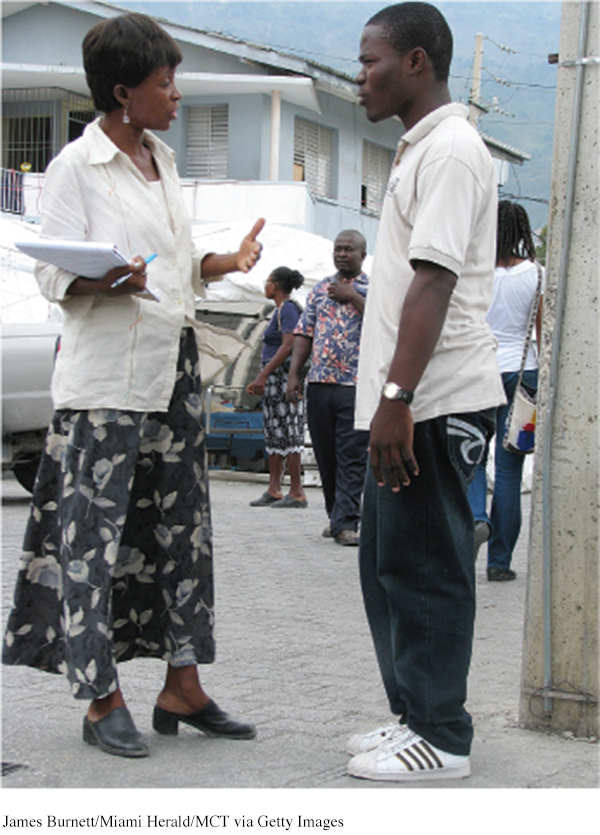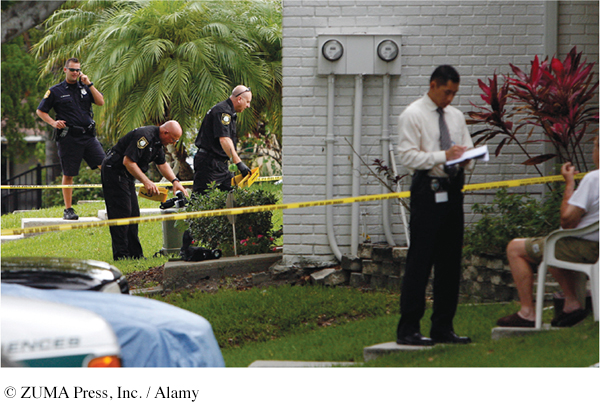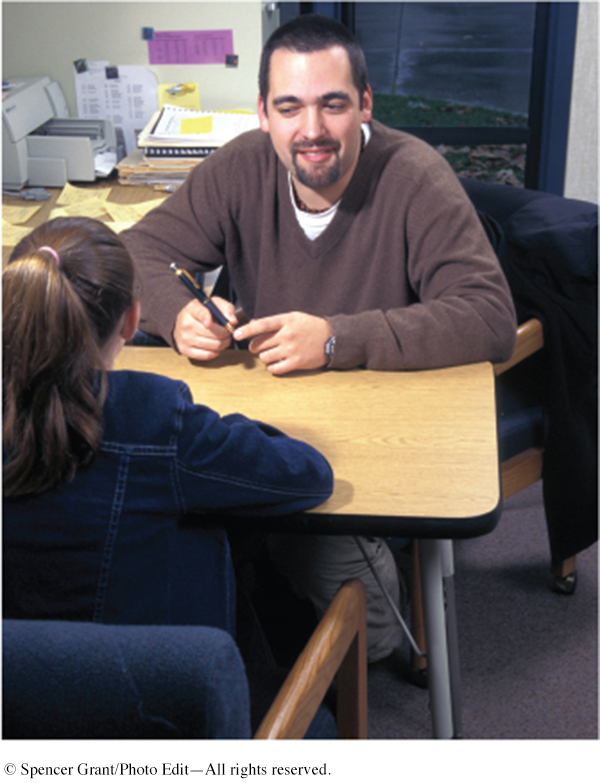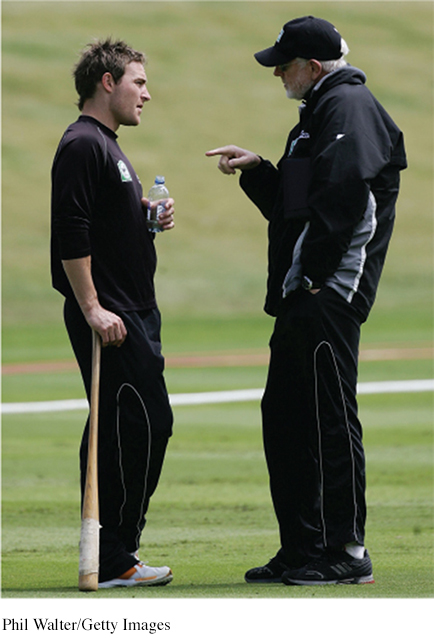Chapter Introduction
Appendix C
Subfields of Psychology
Jennifer Zwolinski, University of San Diego
What can you do with a degree in psychology? Lots!
As a psychology major, you will graduate with a scientific mind-
If you are like most psychology students, you may be unaware of the wide variety of specialties and work settings available in psychology (Terre & Stoddart, 2000). To date, the American Psychological Association (APA) has formed 56 divisions (TABLE C.1). The following paragraphs (arranged alphabetically) describe some careers in the main specialty areas of psychology, most of which require a graduate degree in psychology.
| 1. Society for General Psychology | 29. Society for the Advancement of Psychotherapy |
| 2. Society for the Teaching of Psychology | 30. Society of Psychological Hypnosis |
| 3. Experimental Psychology | 31. State, Provincial, and Territorial Psychological Association Affairs |
| 4. There is no active Division 4. | 32. Society for Humanistic Psychology |
| 5. Evaluation, Measurement, and Statistics Division for Quantitative and Qualitative Methods | 33. Intellectual and Developmental Disabilities |
| 6. Behavioral Neuroscience and Comparative Psychology | 34. Society for Environmental, Population, and Conservation Psychology |
| 7. Developmental Psychology | 35. Society for the Psychology of Women |
| 8. Society for Personality and Social Psychology | 36. Society for the Psychology of Religion and Spirituality |
| 9. Society for the Psychological Study of Social Issues (SPSSI) | 37. Society for Child and Family Policy and Practice |
| 10. Society for the Psychology of Aesthetics, Creativity, and the Arts | 38. Health Psychology |
| 11. There is no active Division 11. | 39. Psychoanalysis |
| 12. Society of Clinical Psychology | 40. Society for Clinical Neuropsychology |
| 13. Society of Consulting Psychology | 41. American Psychology- |
| 14. Society for Industrial and Organizational Psychology | 42. Psychologists in Independent Practice |
| 15. Educational Psychology | 43. Society for Family Psychology |
| 16. School Psychology | 44. Society for the Psychological Study of Lesbian, Gay, Bisexual, and Transgender Issues |
| 17. Society of Counseling Psychology | 45. Society for the Psychological Study of Culture, Ethnicity, and Race |
| 18. Psychologists in Public Service | 46. Society for Media Psychology and Technology |
| 19. Military Psychology | 47. Exercise and Sport Psychology |
| 20. Adult Development and Aging | 48. Society for the Study of Peace, Conflict, and Violence: Peace Psychology Division |
| 21. Applied Experimental and Engineering Psychology | 49. Society of Group Psychology and Group Psychotherapy |
| 22. Rehabilitation Psychology | 50. Society of Addiction Psychology |
| 23. Society for Consumer Psychology | 51. Society for the Psychological Study of Men and Masculinity |
| 24. Theoretical and Philosophical Psychology | 52. International Psychology |
| 25. Behavior Analysis | 53. Society of Clinical Child and Adolescent Psychology |
| 26. Society for the History of Psychology | 54. Society of Pediatric Psychology |
| 27. Society for Community Research and Action: Division of Community Psychology | 55. American Society for the Advancement of Pharmacotherapy |
| 28. Psychopharmacology and Substance Abuse | 56. Trauma Psychology |
Source: American Psychological Association

CLINICAL PSYCHOLOGISTS promote psychological health in individuals, groups, and organizations. Some clinical psychologists specialize in specific psychological disorders. Others treat a range of disorders, from adjustment difficulties to severe psychopathology. Clinical psychologists might engage in research, teaching, assessment, and consultation. Some hold workshops and lectures on psychological issues for other professionals or for the public. Clinical psychologists work in a variety of settings, including private practice, industry, mental health service organizations, schools, universities, legal systems, medical systems, counseling centers, government agencies, and military services.

To become a clinical psychologist, you will need to earn a doctorate from a clinical psychology program. The APA sets the standards for clinical psychology graduate programs, offering accreditation (official recognition) to those who meet their standards. In all U.S. states, clinical psychologists working in independent practice must obtain a license to offer services such as therapy and testing.
COGNITIVE PSYCHOLOGISTS study thought processes and focus on such topics as perception, language, attention, problem solving, memory, judgment and decision making, forgetting, and intelligence. Research interests include designing computer-
COMMUNITY PSYCHOLOGISTS move beyond focusing on specific individuals or families and deal with broad problems of mental health in community settings. These psychologists believe that human behavior is powerfully influenced by the interaction between people and their physical, social, political, and economic environments. They seek to promote psychological health by enhancing environmental settings, focusing on preventive measures and crisis intervention, with special attention to the problems of underserved groups and ethnic minorities. Given the shared emphasis on prevention, some community psychologists collaborate with professionals in other areas, such as public health. As a community psychologist, your work settings could include federal, state, and local departments of mental health, corrections, and welfare. You might conduct research or help evaluate research in health service settings, serve as an independent consultant for a private or government agency, or teach and consult as a college or university faculty member.
COUNSELING PSYCHOLOGISTS help people adjust to life transitions or make lifestyle changes. Although similar to clinical psychologists, counseling psychologists typically help people with adjustment problems rather than severe psychopathology. Like clinical psychologists, counseling psychologists conduct therapy and provide assessments to individuals and groups. As a counseling psychologist, you would emphasize your clients’ strengths, helping them to use their own skills, interests, and abilities to cope during transitions. You might find yourself working in an academic setting as a faculty member or administrator or in a university counseling center, community mental health center, business, or private practice. As with clinical psychology, if you plan to work in independent practice you will need to obtain a state license to provide counseling services to the public.
DEVELOPMENTAL PSYCHOLOGISTS conduct research in age-
EDUCATIONAL PSYCHOLOGISTS are interested in the psychological processes involved in learning. They study the relationship between learning and the physical and social environments, and they develop strategies for enhancing the learning process. As an educational psychologist, working in a university psychology department or school of education, you might conduct basic research on topics related to learning or develop innovative methods of teaching to enhance the learning process. You might design effective tests, including measures of aptitude and achievement. You might be employed by a school or government agency or charged with designing and implementing effective employee-
EXPERIMENTAL PSYCHOLOGISTS are a diverse group of scientists who investigate a variety of basic behavioral processes in humans and other animals. Prominent areas of experimental research include comparative methods of science, motivation, learning, thought, attention, memory, perception, and language. Most experimental psychologists identify with a particular subfield, such as cognitive psychology, depending on their interests and training. It is important to note that experimental research methods are not limited to the field of experimental psychology; many other subfields rely on experimental methodology to conduct studies. As an experimental psychologist, you would most likely work in an academic setting, teaching courses and supervising students’ research in addition to conducting your own research. Or you might be employed by a research institution, zoo, business, or government agency.
FORENSIC PSYCHOLOGISTS apply psychological principles to legal issues. They conduct research on the interface of law and psychology, help to create public policies related to mental health, help law-
HEALTH PSYCHOLOGISTS are researchers and practitioners concerned with psychology’s contribution to promoting health and preventing disease. As applied psychologists or clinicians, they may help individuals lead healthier lives by designing, conducting, and evaluating programs to stop smoking, lose weight, improve sleep, manage pain, prevent the spread of sexually transmitted infections, or treat psycho-

INDUSTRIAL-
NEUROPSYCHOLOGISTS investigate the relationship between neurological processes (structure and function of the brain and nervous system) and behavior. As a neuropsychologist you might assess, diagnose, or treat central nervous system disorders, such as Alzheimer’s disease or stroke. You might also evaluate individuals for evidence of head injuries; specific learning disorders; and neurodevelopmental disorders, such as autism spectrum disorder and attention-

PSYCHOMETRIC AND QUANTITATIVE PSYCHOLOGISTS study the methods and techniques used to acquire psychological knowledge. A psychometrician may update existing neurocognitive or personality tests or devise new tests for use in clinical and school settings or in business and industry. These psychologists also administer, score, and interpret such tests. Quantitative psychologists collaborate with researchers to design, analyze, and interpret the results of research programs. As a psychometric or quantitative psychologist, you would need to be well trained in research methods, statistics, and computer technology. You would most likely be employed by a university or college, testing company, private research firm, or government agency.
REHABILITATION PSYCHOLOGISTS are researchers and practitioners who work with people who have lost optimal functioning after an accident, illness, or other event. As a rehabilitation psychologist, you would probably work in a medical rehabilitation institution or hospital. You might also work in a medical school, university, state or federal vocational rehabilitation agency, or in private practice serving people with physical disabilities.
SCHOOL PSYCHOLOGISTS are involved in the assessment of and intervention for children in educational settings. They diagnose and treat cognitive, social, and emotional problems that may negatively influence children’s learning or overall functioning at school. As a school psychologist, you would collaborate with teachers, parents, and administrators, making recommendations to improve student learning. You would work in an academic setting, a federal or state government agency, a child guidance center, or a behavioral research laboratory.

SOCIAL PSYCHOLOGISTS are interested in our interactions with others. Social psychologists study how our beliefs, feelings, and behaviors are affected by and influence other people. They study topics such as attitudes, aggression, prejudice, interpersonal attraction, group behavior, and leadership. As a social psychologist, you would probably be a college or university faculty member. You might also work in organizational consultation, market research, or other applied psychology fields. Some social psychologists work for hospitals, federal agencies, or businesses performing applied research.
SPORT PSYCHOLOGISTS study the psychological factors that influence, and are influenced by, participation in sports and other physical activities. Their professional activities include coach education and athlete preparation, as well as research and teaching. Sport psychologists who also have a clinical or counseling degree can apply those skills to working with individuals with psychological problems, such as anxiety or substance use disorder, that might interfere with optimal performance. As a sport psychologist, if you were not working in an academic or research setting, you would most likely work as part of a team or an organization or in a private capacity.
* * *
So, the next time someone asks you what you will do with your psychology degree, tell them you have a lot of options. You might use your acquired skills and understanding to get a job and succeed in any number of fields, or you might pursue graduate school and then career opportunities in associated professions. In any case, what you have learned about behavior and mental processes will surely enrich your life (Hammer, 2003).